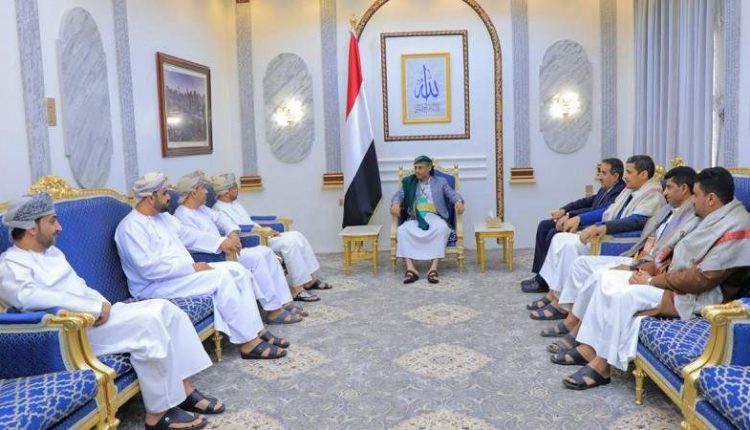President Al-Mashat: No Truce If US-Saudi Aggression Does Not Respond to demands of Yemeni People
President Mahdi Al-Mashat, head of the Supreme Political Council, stressed that there can be no truce if it does not respond to the just demands of the Yemeni People.
This came during his meeting, Thursday, with the delegation of the brotherly Sultanate of Oman, who is currently visiting Yemen as part of the Sultanate’s efforts to bring peace to Yemen.
In the meeting, President Al-Mashat stressed Sana’a’s desire for a just and honorable peace that achieves stability and prosperity for the people of Yemen and the region in general.
President Al-Mashat said: “There can be no truce if you do not respond to the just and just demands of the Yemeni People represented in paying the salaries of all state employees from Yemen’s oil and gas wealth and opening all airports and ports, and there is no way to back down from protecting the oil and gas wealth of the Yemeni people.”
He added, “The patience of the Yemeni people is not endless,” warning that the Yemeni eople may be forced to take steps that would preserve their interests.
He expressed his strong dissatisfaction with the negative role played by America and Britain in Yemeni affairs, and the identification of the UN envoy with the misinformation campaigns led by America and Britain.
On Thursday, the head of the National Delegation Mohammed Abdulsalam confirmed that the visit of the Omani delegation to Sana’a comes as a continuation of the ongoing discussions about ways to end the US-Saudi aggression and lift the blockade as natural and human rights, peace cannot be achieved without them.
Abdulsalam had also confirmed that the visit of the Omani delegation comes to communicate the ideas and proposals that were carried out in the discussions with the Saudis and international parties.
He said, in a statement to Al-Masirah that the US-Saudi aggression makes promises that have no effect regarding the payment of state employees salaries, the end of the siege, and the departure of foreign forces.
He added that the aggression targeted the economic situation and greatly deepened the suffering by targeting the central bank and the currency.
Abdulsalam stressed the need to separate the humanitarian issue from military conflict, indicating that Sana’a’s demands a solution to all Yemenis, without exception, throughout the territory of Yemen.
Abdulsalam linked any progress in the negotiations to progress in the humanitarian issue represented in the payment of salaries and the opening of airports and ports, stressing that the salary issue must be separated in all circumstances.
An Omani delegation arrived Wednesday morning, accompanied by the head of the National Delegation Mohammed Abdulsalam to discuss the latest developments in light of the intransigence of the aggression and its refusal to stop the aggression, lift the siege and pay salaries to all state employees.
A UN-brokered truce lasted for six months in the seven-year-old war waged by Saudi Arabia and its regional allies supported by US and western countries against Yemen.
The truce first came into effect on 2 April, and for an initial two months. It was renewed for another two months in June. The truce has been renewed for an additional two months through 2 October.
The deal stipulated halting offensive military operations, including cross-border attacks, and allowing fuel-laden ships to enter Yemen’s lifeline Hodeidah port and commercial flights in and out of the airport in the capital Sana’a “to predetermined destinations in the region.”
However, in light of UN silence, the Saudi-led aggression was still obstructing flights to the Sana’a International Airport in Yemen’s capital and detaining fuel ships that were headed to the country. The fires of the aggression side did not subside along the fronts, on the borders and inside, including shelling, reconnaissance, development and crawl.
When the period specified for the military and humanitarian truce was nearing its end, the US-Saudi aggression seemed to be in a hurry to adopt the option of extending it for the third time to freeze the battle in Yemen and its economic repercussions away from global energy markets.
The forces of aggression are pushing for an extension, not out of concern for peace, but rather out of fear that the escalation will add more complications to the international scene in addition to the crisis imposed by the Russian-Ukrainian war.
A truce, the positive effects of which have not been felt by the citizens over the past months, despite its broad headlines. Commercial flights to Cairo are still stumbling until today, and the navy of aggression continues to pursue fuel ships without respect for agreements or any regard for international laws and norms.
The truce, however, expired amid the Saudi-led coalition’s constant violations of the agreement and its refusal to properly lift a siege that it has been enforcing against Yemen since the beginning of the war.
The Supreme Political Council required, in order to extend the truce, the commitment of the Saudi-led aggression to pay the salaries of all employees and the rest of the services, as a natural entitlement that is not subject to extortion. Before that, the complete blockade of Sana’a airport and the port of Hodeidah must be lifted as a criterion for demonstrating the seriousness and goodwill in the faltering peace process in Yemen.
Although the US-Saudi aggression seeks to extend thetruce, it with UN complicity, is still evading the implementation of humanitarian and legal entitlements, foremost of which is the paying employee salaries and entering fuel ships to the port of Hodeidah, which made Sana’a refuse to extend the temporary truce.

